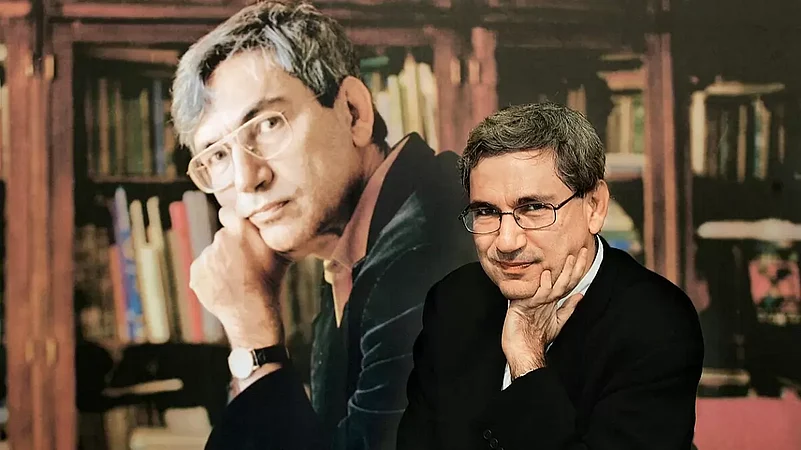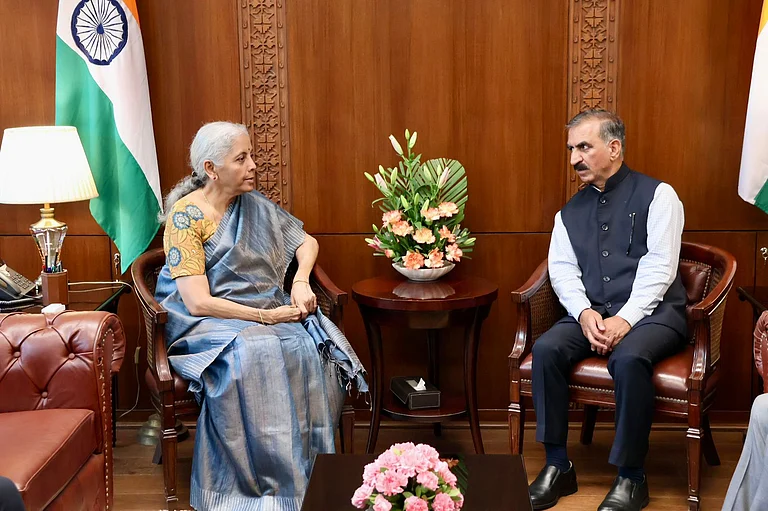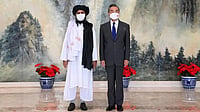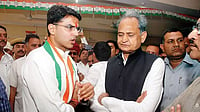Perturbed by the growing authoritarianism under Recep Tayyip Erdoğan’s regime, in his latest novel Orhan Pamuk carefully juxtaposes the idea of a plague with the growing political suppression in his country, producing an allegorical novel set in the times of the Ottoman empire. He had the idea first four decades ago, when he was barely known in the wider English-speaking world. In 2016, unaware of how events would unfold, Pamuk finally set off on the daunting task of research for the book and then began writing it. But before he could finish the book, the real pandemic struck the world, giving him a live case study for the Nights of Plague.
Unlike Defoe, Manzoni and Camus, among the writers who wrote the greatest plague novels, Pamuk witnessed the pandemic personally, a striking difference that makes Nights of Plague more realistic. After its publication in 2021, the novel invited trouble for the Nobel Prize-winning author in Turkey. Pamuk, often known for his ventures into storytelling with the air of a historian, is facing an investigation from the authorities for allegedly inciting animosity by insulting one of the founding fathers of the Turkish Republic, Mustafa Kemal Atatürk, and the Turkish flag, in the book.
However, this is not the first time the writer has irked the Turkish regime. In 2005, he faced charges for ‘insulting Turkishness’ when had told a Swiss newspaper Der Tages-Anzeiger about the horrors that Turkey had wreaked on the Kurds and the Armenians. Pamuk later found himself in the midst of a spate of malicious campaigns played up by the Turkish nationalist press. He received death threats; his books were burned. To date, Pamuk still walks around with bodyguards, but that hasn’t stopped him from voicing his opinions, despite Erdoğan’s claws getting tighter and fiercer for his critics.
Pamuk has just returned to his New York apartment from Paris, where he was busy touring for his art book Memories of Distant Mountains, an amalgam of his journal entries, drawings, and paintings.
In the interview, Pamuk talks about writing fiction, growing authoritarianism, documenting history through novels, and the innate tendency of human beings to preserve memory. Pamuk also talks about Nights of Plague—a 680-page historical epic that tells a gripping, funny story of Mingheria, an imaginary island, struck by a pandemic and authoritarianism. Here are edited excerpts.
Nights Of Plague is more than 680 pages long, your longest book so far. Can you tell me a bit about your routine? How much discipline and labour went into this?
I am a disciplined writer, but I don’t require much discipline because I love what I’m doing. A lot of research went into the book. I read memoirs of the retired Ottoman governors who ran the empire during its last decade. Most of them published their memoirs in the 1950s.
Another important source I delved into was a vast treasure of doctors’ reports. British colonial doctors in Shanghai and Bombay were busy fighting against the third bubonic plague pandemic which started in 1897. This plague, which my novel is partly about, killed 20 to 25 million people in Asia (China and India) while very few people died in the West. I thought, “Wow! Isn’t this a strange situation?”. As an East-West writer, this was one of the reasons that motivated me to write this book. These colonial doctors wrote daunting and revealing reports; sometimes the reports would be as long as 500 pages. My novel is also partly based on these doctors’ reports. The response to the pandemic was authoritarian. Sometimes they would burn villages in order to stop the plague. In Bombay, they sprayed apartments with
lethal disinfectants. It was very hard to stop these modes.

Your novels are deeply rooted in history and you are known for resurrecting memories from the past like a historian. Is your fiction nostalgic in nature? In fiction, is preserving memory central to nostalgia?
I write lovingly about the Ottoman period. I like its details. I like researching and peeking into history. Nevertheless, writing about a
period, or a group of people with vibrancy and detail does not necessarily mean that you want to go back to that period. This is a very important distinction for me.
I write with enthusiasm about the Ottoman period— not the Ottoman military victories over the West and Christians, as Erdoğan’s people do. I enjoy writing about the decay and disintegration of the great Ottoman empire. Nights of Plague, in a way, is a panoramic picture of the Ottoman Empire. But, writing lovingly about some past periods, based on observation or imagination, does not really mean that I want to go back to the Ottoman period. The Japanese author, Tanizaki, wrote a lovely book about old Japanese wooden houses, and he was asked by someone, “Wow, Mr. Tanizaki, do you want to live there?” He said “No! No! I love my electricity, my heating system, the modern amenities.”
I don’t think that was dishonest. I may be a secular or non-religious person who may cherish a religious miniature, a painting, or maybe write about the Ottoman times, but I’m not nostalgic. I do not want to go back there. I might rather prefer the Turkish Republic.
How accurately does the novel as an art form serve as a dutiful document to preserve memory or history?
It is. It serves. I strongly believe that novels are like museums— the way we talk, the way we bury our subjects, our daily life, the way we take a bus, or the way we walk in urban streets or look at the windowpanes, our little love affairs, and so on. Our lives are made up of endless details. It is a human tendency to preserve and museumise those details, and whenever we come across such details in a novel, or a museum, we relate to them. For Instance, if I mention a bus stop in Istanbul in one of my novels, and if a reader lives around the same bus stop, it cheers him up. It is like seeing your high school textbook or your identity card in a museum. Humans love to collect these details and put them on a pedestal.
James Joyce is exactly doing that in Ulysses. We want to preserve the memory or the details from our lives. But historical novels are not only about preserving the past. There is no doubt a lot of attention to detail in my new book, and the insights are very realistic. I
labour like a clerk. During my research for Nights of Plague, I read documents ranging from historical texts, and doctors’ reports, to governors’ memoirs. Once a novelist creates work like this— very accurate, very realistic— he inserts a fictional character. For instance, while writing War and Peace, Tolstoy researched so much that he ended up reading around fifty biographies of Napoleon. Then he inserted an imaginary character— Pierre Bezukhov, the protagonist, into the epic. That is why we read or write fiction, and that is why historical fiction is important. We want to delve into a world that existed— and we hope that the writer gets the details right — and we want to identify with a fictive person who would, for example, resolve the conflicts in that world. Readers or writers do not want to identify with Napoleon. We want to identify with a fictional person like Bezukhov who would show us his world and help us understand that period.

As a young man, you had written a book you could never publish because of the then-existing military regime in Turkey. Things are somewhat still the same. As Erdoğan’s Turkey becomes more intolerant, do you ever censor your own work to avoid trouble? Do you exercise any degree of self-restraint in your novels?
The novel you spoke about is still unpublished. It is lying in my archives. However, I never censor my novels. I have never faced any trouble for writing novels. Rather, I have always had trouble with the reviews and interviews with journalists, or the essays I write. I never curtail my artistic freedom, and I will not write a novel where I need to curtail my voice. Unlike novelists, it is brave people like journalists who often face troubles. I was never been investigated for a novel before this. Now, however, I am facing an investigation for allegedly ridiculing the Turkish flag and Atatürk. But my lawyer has told me not to worry. Anyway, I’m always in trouble for being vocal in the press. I still have bodyguards around, although not as many as I used to. Sometimes my friends say “Orhan, you talk too much. Why don’t you shut up for a month?” I do! I listen to them. Honestly, I do not deny that I am afraid; I am a normal person. They are doing horrors to people, and I always try to navigate with utmost caution. It has not been easy for me to survive and continue what I do. However, at times it is, like, I mean, I am seventy and I don’t care— whenever I get angry, I talk. [Laughs]
During your youth, you used to paint. Has painting added anything to the art of your writing?
Pamuk: The painter in me had died, I had killed him. But nearly a decade or more ago, I resurrected him once again. I am fond of keeping illustrated journals wherein I detail my travels and paint places. Some of those illustrations have just been published as Memories of Distant Mountains, an art book in Turkish and French. In that book, there are a lot of paintings of India. The country is beautiful but I’m sad about the political developments there, especially the aggravating assault on the Muslims over the past several years.
I consider myself a visual writer. My examples are the novels of Leo Tolstoy, Nabokov and Marcel Proust. When they describe a scene, it is not only an array of Shakespearean dramatic lines. If they are describing a cup, they will make sure you see it visually as well— its colour, its pinkness, for example. They are tender about material things and they form an atmosphere. Moreover, I often memorise things through pictures, believing that my memory is based on visuals rather than words. For instance, I’m not good at memorising a poem, but I am good at remembering a picture. I divide humanity into two types: visual persons and verbal persons. I am a visual person.
Tell me, how do writers find their style, or what we call the ‘voice’ in literary terms?
You cannot self-consciously invent it. This was partly my subject in My Name Is Red. There were painters and miniaturists in the book who had their own unique voices, or styles. But they did not make it in a day. You develop your unique voice in literature, or a unique style in art, once you start doing it consistently. For a writer, it comes with a lot of labour and a lot of writing—you write and write, and keep writing and you will eventually discover your voice. You reach there unintentionally. William Kentridge, a famous artist, believed that painters do not find their styles self-consciously. It is a process through which you arrive at it.
However, a lot of work is necessary, so that your spirit and your character emerges. Your individual identity will shine through only after a lot of reading, writing, failing, and starting again. Initially, it is difficult, because a writer is influenced by the writers he has read. You want to write like Dostoevsky, like Tolstoy. You begin to imitate because you want to write like that. Your style, your uniqueness, disappears, but after a while, it emerges. This needs a lot of self-confidence. One has to follow one’s own humours, I would say, as Samuel Johnson would have said.
Do you read what your critics write?
Yes, I read my critics a lot. However, if a person is criticising “every” book I write, and it becomes his habit to trash me, then I stop reading him. If it is a new person, whether in Turkey or elsewhere, I always read. I do not read such pieces where the writer copies text from the jacket of my books. I would rather read something that is original, for instance how the critic reads the book, and what he makes out of it.
(This appeared in the print edition as ‘Novels are Like Museums’)


























